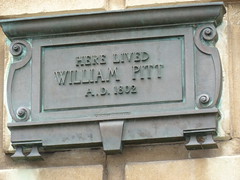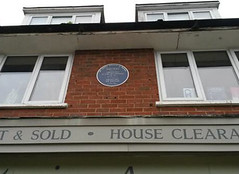William Pitt


William Pitt
(1759-1806)
politician, 15th Prime Minister of the United Kingdom (1783-1801), and 17th Prime Minister of the United Kingdom (1804-1806)
Family tree
Commemorated on 5 plaques
William Pitt the Younger 1759-1806 lived here 1803 to 1804
120 Baker Street, Westminster, W1, London, United Kingdom where they lived
XII century cottage used by William Pitt (1759-1806) as country retreat
The Kinara at William Pitt's Cottage, High Street, Westerham, United Kingdom where they used as a country retreat
Behind these premises stood Hayes Place the home of William Pitt 1st Earl of Chatham 1708-1778 British Prime Minister and the birthplace of William Pitt the Younger 1759-1806 British Prime Minister
25 Hayes Street, Hayes, Bromley, BR2 7LE, London, United Kingdom where they was born (1759)
This house occupies part of the site of what was originally known as the Great House of Lyme Regis. Here lodged in the summer of 1773 William Pitt (1708-1778), first Earl of Chatham, the great War Minister of George II, and his son William Pitt (1759-1806), the great Prime Minister of George III. Also for some months in 1796-1797 it was the home of Mary Russell Mitford (1787-1855) essayist & dramatist
Boots, 45 Broad Street, Lyme Regis, United Kingdom where they stayed (1772)





